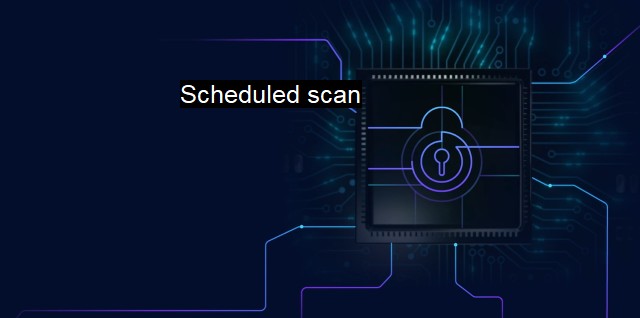What is Scheduled scan?
Strengthen Your Cybersecurity: The Vital Role of Scheduled Scans in Antivirus Software
"Scheduled scan" is a central cybersecurity function and an essential feature of any vigorous antivirus software. Scheduled scanning is a method by which security software, such as antivirus or anti-malware solutions perform scans across the system or network at pre-determined times. It is part of a proactive approach to cybersecurity, designed to detect and neutralize potential threats even before they can unleash their harmful operations.Fundamentally, the purpose of a scheduled scan in the cybersecurity and antivirus context is ensuring that a computer system or a network infrastructure remains unaffected by malicious programs. Malware programs, including viruses, worms, trojans, ransomware, and spyware, constantly evolve, becoming more complicated and harder to detect and neutralize. That is where a scheduled scan using up-to-date antivirus software can maintain a robust cybersecurity posture.
Scheduled scans are often set to perform exhaustive and deep inspections of a computer system or network. Such an inspection entails scanning every corner of the system hardware, every byte of stored data, as well as the operating software and associated applications. The antivirus software scrutinizes every data area conceivable, seeking out tell-tale signs of malware. If it detects any suspicious or recognised harmful files, it will typically quarantine those files or remove them essentially keeping the system safe.
One of the key metrics for designing a schedule for the system scan is balancing the need for security and the capability of the system to withstand the intensive process. Frequent system scans ensure better protection but may slow down the system significantly. Therefore, cybersecurity experts recommend scheduling a scan during periods of minimum system activity, for instance, overnight. Advanced antivirus software allows flexible scheduling for different types of scans (quick, custom, or full scans) aiding the balance between effective protection and system performance.
Scheduled scans are not the only method of keeping a cybersecurity check, but they are an integral part of defense-in-depth security, contributing to its multi-layered assurance. Alongside real-time protection that guards a computer system constantly, scheduled scans ensure that no malware has slipped through the cracks. These scans also complement manual scans initiated by users at their discretion. With the close integration of scheduled scans, real-time protection, manual scans, and updates to antivirus software, an effective strategy to repel malware attacks can be established.
Recent cybersecurity advancements have made the scheduled scan smarter, enabling it to learn from prior scans. For instance, scanning algorithms now prioritize scanning the areas marked as high risk during previous scans or where an invasive operation has recently happened. This intelligent scanning does not sacrifice thoroughness but enhances the scanning efficiency, maximizing the potential to capture new threats early on.
Scheduled scanning is versatile and can be made industry-specific. This flexibility becomes paramount when considering the need for different organizations types and their critical infrastructure. Industries such as healthcare, finance, and defense, among others, demand rigorous cybersecurity measures, and scheduled scans play a primary role in such security policies.
a scheduled scan is an integral component of competent antivirus software and a potent cybersecurity tool. Its methodical approach to detecting and dealing with threats even before they can inflict any damage is critically beneficial. By leveraging sophisticated scanning algorithms and learning from prior scanning experiences, the scheduled scan possesses the agility and intelligence to keep abreast of continuously evolving malware threats. The thoughtful balance of scan thoroughness, system performance, and precision in detection makes scheduled scan indispensable in the contemporary cybersecurity landscape.

Scheduled scan FAQs
What is a scheduled scan and why is it important in cybersecurity?
A scheduled scan is a feature in antivirus software that automatically runs a system scan at a predetermined time interval. It is crucial in cybersecurity as it helps to detect and remove viruses, malware, and other malicious software before they can cause damage to your computer, network, or data.How do I set up a scheduled scan in my antivirus software?
The process may vary depending on the antivirus software you are using. However, you can generally access the scheduled scan settings from the software's interface, typically under the "Settings" or "Options" menu. From there, you can choose the frequency, time, and type of scan you want to run.Can I still use my computer while a scheduled scan is running?
Yes. Most antivirus software is designed to run scheduled scans in the background while you continue to use your computer. However, keep in mind that running a scan can slow down your computer's performance, so it's best to avoid resource-heavy tasks such as gaming or video editing during the scan.What should I do if a scheduled scan detects a threat?
If your antivirus software detects a threat during a scheduled scan, it will typically prompt you to take action. It's essential to follow the instructions given by the software to remove or quarantine the threat. Don't ignore the warning, as it could lead to serious cybersecurity issues or data loss. If you're unsure about what to do, seek advice from a cybersecurity expert.| | A | | | B | | | C | | | D | | | E | | | F | | | G | | | H | | | I | | | J | | | K | | | L | | | M | |
| | N | | | O | | | P | | | Q | | | R | | | S | | | T | | | U | | | V | | | W | | | X | | | Y | | | Z | |
| | 1 | | | 2 | | | 3 | | | 4 | | | 7 | | | 8 | | |||||||